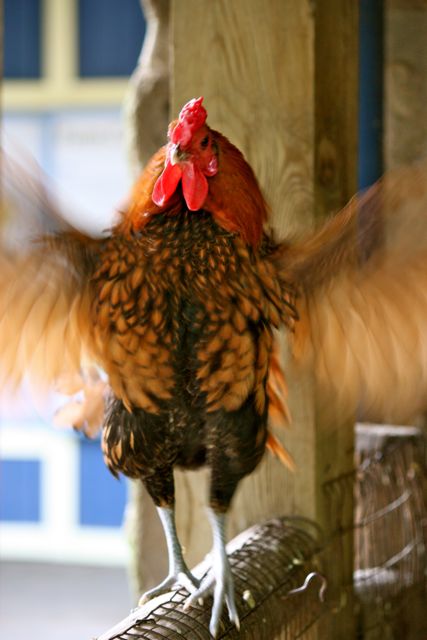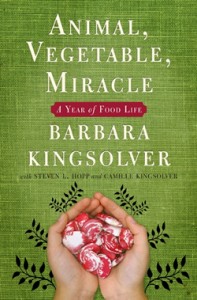This is the story…
of how our family was changed by our first year of deliberately eating food
produced from the same place where we worked, went to school,
loved our neighbors, drank the water, and breathed the air.
-Barbara Kingsolver,
Animal, Vegetable, Miracle: A Year of Food Life
In early 2008 I took two books out of the library that changed my family. The first was Richard Louv’s Last Child in the Woods: Saving Our Children from Nature-Deficit Disorder. The second was Barbara Kingsolver’s Animal, Vegetable, Miracle. Her story is absolutely what inspired me to alter our story, and those two books are what inspired this blog.
Kingsolver’s game changing, life changing story involves her family’s journey from the food desert of Arizona back to the land in Virginia, and their commitment to one year of living la vida local. It’s one part memoir, one part historical narrative, one part cookbook and one part political manifesto, with a healthy dose of ethical undertone thrown in for seasoning.
After reading it, I…
undertook my own eat local project…
…which eventually grew into a real love and appreciation of my co-op’s farmers market. I developed friendships with the farmers and small businesses I saw there week after week, felt really good about where my dollars were going, and have been asked to work with my local chapter of Slow Food USA this year to help others discover the joys of local food and like-minded companionship.
learned to cook…
… sort of. I’m still no chef, trust me, but I can cook lots of simple meals and have become brave enough to try more complex recipes and experiment with brand new ones. We embraced new foods like rainbow chard just because it was in season. My kids have been exposed to a whole world of tastes and textures that I never was, and they have learned to cook as well. It’s healthier for them on so many levels— the willingness to try new things, the ability to control their own sugar and fat intake as they grow older, and I can’t help but think that my boys will make such good husbands one day with their cooking prowess.
tried to garden.
I’m not very good at it, and every year Jeff announces that this is my last gardening attempt. Stick a fork in me, I’m done. I’m terrible about the upkeep, and the weeds pop up faster than I am willing to pluck them. Granted, there is a wonderful taste of victory when you cook and eat your own fresh green beans, heritage tomatoes, lettuce greens, basil and rosemary and parsley. There is also potential for soul-crushing defeat when deer consume your entire vegetable plot overnight just as your efforts begin to set fruit. I continue to plant those seeds and starters in spring, because to me there is no better symbol of hope… but for us, in our shade garden, it’s not the same symbol of freedom that it was for the Kingsolvers.
stopped buying processed junk.
Not entirely. But mostly, I eat real food. And I’ll preach that practice until the day I die. Our bodies have evolved, slowly, for generations, to efficiently use the nutrients found in food. To eat anything else is to willingly submit to volunteering your and your children’s bodies as guinea pigs for science experiments. This seems like hyperbole, but I’m not kidding. How many illnesses might be attributed to consistently consuming things our bodies aren’t fully equipped to process?
stopped wasting food.
Seriously. Now that I know how much effort goes into growing and cooking the stuff, throwing it out just kills me.
changed my shopping habits.
I’m far from perfect, but I buy mindfully, in the grocery store and everywhere else. I care a whole heck of a lot about who my dollar benefits and how my choices affect the earth. I strive to keep my money in the community, or at least supporting companies whose ethics I support.
cherish food moments.
Not every meal is a masterpiece, and to be honest I don’t cook special meals as often as I did when I first started all this (I wasn’t working full-time in 2008). But I do ask my kids to help me when I cook new things, and we eat them together, and remember them together later. Holidays are especially precious. Food and memory and emotion are all tied up together in our lives, and when you roll up your sleeves and work hard to produce something memorable, there is something glorious about that.
What I still haven’t done…
canning and preserving.
I’ll come right out and admit it: I’m scared. I’m afraid of doing something wrong and poisoning us all. The lovely people at Ball sent me a starter kit— I think I won it somewhere, I can’t even remember— and it has been collecting dust for a year at least. This summer I swear I will have someone teach me.
raised poultry.
My favorite passages of Animal, Vegetable, Miracle involve turkey raising, and I’m not even going to tell you about them because I want you to read them. But I will say this: I learned from this book that turkeys are too stupid to have sex without human intervention. I already knew that chickens have been bred to have breasts so large, they cannot even support their own weight on their own two feet, meaning that those “cage-free” specimens at the grocery store are meaningless. I have friends who raise eyebrows at my willingness to raise and slaughter my own fowl, but at least I would know that those birds got a real life and a humane death.
However, based on my inability to take care of a carrot bed, Jeff’s putting his foot down about the chickens I covet. We’ll see. Maybe in a few years, when the kids are older and can help out there.
Rocking my thinking… again
My first time reading Animal, Vegetable, Miracle I was fascinated by all the info that was new to me, by their project, and it propelled me into a new way of life. Reading it again, three years later, I was more struck by Kingsolver’s assessment after the year was over:
If our special way of eating had seemed imposing at first, gradually it was just dinner, the spontaneous background of family time as we met our fortunes one day, one phone call, one hospital visit, wedding, funeral, spelling bee, and birthday party at a time. It caused us to take more notice of food traditions of all kinds— the candy-driven school discipline program, the overwhelming brace of covered dishes that attend a death in the family. But in the main, our banana-free life was now just our life…
Our plan to make everything from scratch had pushed us into a lot of great learning experiences. In some cases, what we learned was that it was too much trouble for everyday… Altered routines were really the heart of what we’d gained.
The difference between a book and a blog is that with a book you get to have closure, an ending.
Sometimes with this blog I become discouraged; I don’t start a lot of new projects anymore. I don’t know what to write about because all this has become the backdrop of my life. It didn’t happen all at once; it was one step at a time, sometimes two steps back. But I find out-of-season, trucked-cross-country apples just don’t taste as good. When I go back to drinking soda, I feel yucky. And when we make our cakes out of a box, we all feel like we’ve cheated ourselves out of something more expensive, more time-consuming, more effort— but also just better for us, better tasting, better feeling.
We’ve internalized so much and it has become normal for us, our routines have become forever altered.
I’ll keep writing because I don’t think I can stop, just as I don’t think I could start eating apples flown in from New Zealand or buying factory-farmed chickens, even if they are hyperlocal. My hope has always been to inspire someone else to begin the journey, because if we could do it, surely you can.
But if you wouldn’t mind leaving me a comment about what you’d like to know about?
That would make my day.

 Could you live an entire year eating locally or the food from your garden? Barbara Kingsolver transplanted her family from the deserts of Arizona to the mountains of Virginia for their endeavor. Join From Left to Write on February 21 as we discuss Animal, Vegetable, Miracle: A Year of Food Life
Could you live an entire year eating locally or the food from your garden? Barbara Kingsolver transplanted her family from the deserts of Arizona to the mountains of Virginia for their endeavor. Join From Left to Write on February 21 as we discuss Animal, Vegetable, Miracle: A Year of Food Life by Barbara Kingsolver.
As a member of From Left to Write, I received a copy of the book to highlight and dog-ear and otherwise prep for future blog posts. All opinions are my own.

Leave a Reply